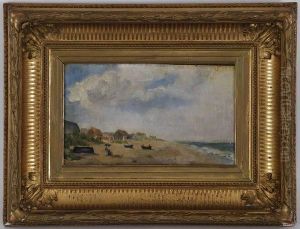Lucien Fugere Paintings
Lucien Fugère was a French baritone, later tenor, celebrated for his performances in the operatic repertoire. Born on July 22, 1848, in Paris, France, Fugère had a career that spanned more than five decades, during which he became known for his versatility, musicianship, and longevity as a performer.
Fugère's initial musical training was as a choirboy, which led to further studies at the Paris Conservatoire. He won first prize in singing and opéra comique there, which set the stage for his professional debut in 1869 at the Théâtre Lyrique as Pygmalion in Victor Massé's 'Galathée.' His early career was mostly spent in the provinces, but his talent soon brought him back to Paris.
He joined the company of the Opéra-Comique in 1872, where he would remain for an impressive 35 years. Fugère's voice was initially that of a high baritone, which allowed him to perform a wide array of roles. However, his voice transitioned to that of a tenor as he aged, a rare vocal development. Despite this shift, he continued to perform some of his baritone repertoire while taking on tenor roles. This vocal flexibility contributed to his sustained success.
Lucien Fugère was particularly associated with the works of Jules Massenet and created roles in several of his operas, including 'Manoël' in 'Don César de Bazan' and 'Renaud' in 'Le Cid.' He was also noted for his performances in the operas of Charles Gounod, Georges Bizet, and other prominent composers of the day.
As an esteemed artist at the Opéra-Comique, Fugère was involved in the premieres of many new works. He became a favorite of Parisian audiences and was considered a quintessential French opera singer of his time, embodying the style and elegance of the French operatic tradition.
Beyond his stage work, Fugère was also a respected teacher. After retiring from the Opéra-Comique in 1907, he devoted more time to teaching, sharing his wealth of experience with the next generation of singers.
Fugère's contribution to the arts was recognized in France when he was made a Chevalier of the Legion of Honour. His legacy is preserved in a number of early recordings that capture his voice and artistry, providing a valuable insight into the performance practice of his era.
Lucien Fugère's career longevity and artistic impact made him a significant figure in late 19th and early 20th-century French opera. He passed away on September 15, 1935, in Paris, leaving behind a rich legacy as one of the era's most distinguished opera singers.
